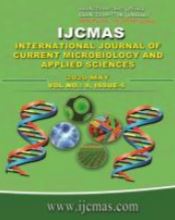


 National Academy of Agricultural Sciences (NAAS)
National Academy of Agricultural Sciences (NAAS)

|
PRINT ISSN : 2319-7692
Online ISSN : 2319-7706 Issues : 12 per year Publisher : Excellent Publishers Email : editorijcmas@gmail.com / submit@ijcmas.com Editor-in-chief: Dr.M.Prakash Index Copernicus ICV 2018: 95.39 NAAS RATING 2020: 5.38 |
The phylloplane and rhizosphere microbes of rose cv. Edward was isolated and nine bacteria were selected to observe their antagonistic efficacy against Diplocarpon rosae causing blackspot disease in rose. The per cent inhibition of mycelial growth of the fungi by bacterial isolates was observed. The bacterial isolates PB1 and PB2 recorded 100 per cent inhibition followed by SB1, PB2 and SB2 isolates. After molecular characterization the isolates PB1 and PB3 were found to be Pseudomonas aeruginosa and it causes life threatening infections in human beings however, the isolates SB1, SB2 and PB2 were identified as Bacillus subtilis, Brevibacillus sp., Lysinibacillus fusiformis respectively. In the field experiments the native isolate Brevibacillus sp. (SB2) was highly effective in reducing the leaf spot disease incidence by 42.94 and 33.39 per cent in Kashmir rose and Edward rose varieties with C:B ratio of 1:2.69 and 1:2.82 respectively followed by L.fusiformis (PB2) with 38.26 and 31.07 per cent reduction in disease incidence by reducing the defoliation with a C:B ratio of 1:2.60 and 1:2.59. This study indicated that the new bacterial isolates isolated from rhizosphere (Brevibacillus sp.) and phylloplane (L.fusiformis) of rose cv. Edward have the potential to produce antifungal compounds which can be used to control the black leaf spot disease of rose caused by D.rosae.
 |
 |
 |
 |
 |